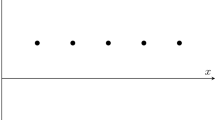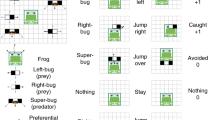Abstract
Moore’s Mechanical Choices is ripe with interesting ideas. Here I’ll focus on a particularly intriguing one that intersects with some aspects of my own work. It’s the suggestion that causalism should be amended in a way that doesn’t require causation. At first, this suggestion may sound absurd: How can causalism survive without causation, of all things? But I think that Moore is actually right about the main suggestion. I don’t think he’s right for the right reasons, but he’s still right about the main idea. So, the aim of this paper is to explain how causalism can survive without causation, and how it may not.
Similar content being viewed by others
Notes
Moore uses “willings” but I’ll stick with “intentions,” which I think is a more neutral and less ambiguous term. (What are willings supposed to be: are they tryings, decidings, or something else altogether? It’s not fully clear. Mele raises these questions in his 2017: 72–3.).
Moreover, this isn’t just because of what Moore thinks about omissions (Moore thinks that, whereas causalism should be able to capture the type of agency involved in omitting to act, omissions are not the kinds of things that can be involved in causal relations). But it’s also for this reason, as I explain in Sect. 5 below.
Here I am paraphrasing Moore (see his p. 74 and 423).
Interestingly, Moore seems to implicitly recognize the existence of the earlier intention when he writes, about his Paralyzed Patriot case: “Intending to convey the information that he has (that the British are coming by boat), PP wills the movement of his paralyzed finger…” (pp. 422–3, my emphasis).
I discuss responsibility for non-causal consequences in Sartorio 2022.
I argue for this in more detail in Sartorio Forthcoming. See also Sartorio 2021.
It’s also an ordinary explanatory connection in the sense that it’s not teleological (or irreducibly teleological) in nature, in opposition to what some non-causalist views of agency say.
References
Beebee, H. 2004. “Causing and Nothingness.” In J. Collins, N. Hall, and L. A. Paul (eds.), Causation and Counterfactuals, Cambridge, Mass: M.I.T. Press, pp. 291-308.
Dowe, P. 2001. “A Counterfactual Theory of Prevention and ‘Causation’ by Omission.” Australasian Journal of Philosophy 79 (2): 216-26.
Hornsby, J. 1980. Actions. Routledge.
Joyce, J. 1999. The Foundations of Causal Decision Theory. Cambridge University Press.
Lewis, D. 1976. “The Paradoxes of Time Travel.” American Philosophical Quarterly 13: 145-52.
Lewis, D. 1981. “Are We Free to Break the Laws?” Theoria 47: 113-21.
Lewis, D. 1986a. “Causation.” In Philosophical Papers, Volume II, New York: Oxford University Press, pp. 159-213.
Lewis, D. 1986b. “Events.” In Philosophical Papers, Volume II, New York: Oxford University Press, pp. 241-69.
Libet, B., C. A. Gleason, E. W. Wright, and D. K. Pearl. 1983. “Time of Conscious Intention to Act in Relation to Onset of Cerebral Activities (Readiness Potential); the Unconscious Initiation of a Freely Voluntary Act.” Brain 106: 623-42.
Mele, A. 2009. Effective Intentions: The Power of Conscious Will. Oxford University Press.
Mele, A. 2017. Aspects of Agency: Decisions, Abilities, Explanations, and Free Will. Oxford University Press.
Moore, M. 2009. Causation and Responsibility: An Essay in Law, Morals, and Metaphysics. Oxford University Press.
Moore, M. 2020. Mechanical Choices: The Responsibility of the Human Machine. Oxford University Press.
Sartorio, C. 2015. “The Problem of Determinism and Free Will Is Not the Problem of Determinism and Free Will.” In Mele, A. (ed.), Surrounding Free Will: Philosophy, Psychology, Neuroscience, Oxford University Press, pp. 255-73.
Sartorio, C. 2021. “Responsibility and the Metaphysics of Omissions.” In S. Bernstein and T. Goldschmidt (eds.), Non-Being: New Essays on Non-Existence, Oxford University Press, pp. 294-309.
Sartorio, C. 2022. “Responsibility and Causation.” In D. Nelkin and D. Pereboom (eds.), Oxford Handbook of Moral Responsibility, Oxford University Press.
Sartorio, C. Forthcoming. Causalism. Oxford University Press.
Sider, T. 2002. “Time Travel, Coincidences, and Counterfactuals.” Philosophical Studies 110, 2: 115-38.
van Inwagen, P. 1975. “The Incompatibility of Free Will and Determinism.” Philosophical Studies, 27, 3: 185-99.
van Inwagen, P. 1983. An Essay on Free Will. Oxford: Oxford University Press.
Varzi, A. 2007. “Omissions and Causal Explanations.” In F. Castellani and J. Quitterer (eds.), Agency and Causation in the Human Sciences, Paderborn: Mentis Verlag, pp. 155-67.
Acknowledgements
I presented an earlier version of this paper at a symposium on Michael Moore’s book at Rutgers University in May 2022. Thanks to the organizers, Doug Husak and Alec Walen, and to Michael and the audience members for discussion. Thanks also to Alec for helpful editorial suggestions.
Author information
Authors and Affiliations
Corresponding author
Additional information
Publisher's Note
Springer Nature remains neutral with regard to jurisdictional claims in published maps and institutional affiliations.
Rights and permissions
Springer Nature or its licensor (e.g. a society or other partner) holds exclusive rights to this article under a publishing agreement with the author(s) or other rightsholder(s); author self-archiving of the accepted manuscript version of this article is solely governed by the terms of such publishing agreement and applicable law.
About this article
Cite this article
Sartorio, C. Causalism Without Causation. Criminal Law, Philosophy 18, 185–199 (2024). https://doi.org/10.1007/s11572-023-09677-5
Accepted:
Published:
Issue Date:
DOI: https://doi.org/10.1007/s11572-023-09677-5




